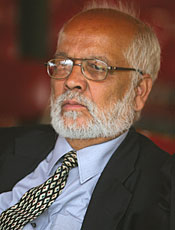Nilambar Acharya is the newly elected chair of the Constitutional Committee. Himal Khabarpatrika spoke to Acharya about the constitution-writing process and challenges. Excerpts:
Himal Khabarpatrika: What do you think are the major challenges for the constitution writing process? 
Nilambar Acharya: The biggest challenge is the growing animosity between the political parties, since a political consensus is crucial to complete the new constitution. Secondly, the peace process is not moving smoothly. Thirdly, there is the tendency to ignore the interim constitution and earlier agreements.
There's no agreement even on basic constitutional issues. For example, they haven't agreed on whether to have a presidential or prime ministerial system. The first session of the CA on 28 May, 2008 declared Nepal a democratic federal republic, but now some dispute even this. A democratic federal republic is our commitment and the constitution should be written on this basis as we agreed earlier.
Is it possible to complete writing the constitution within seven months?
Not unless relations between parties improve and there is a culture of compromise, consensus and rule of law, which shouldn't be hard to bring about. But we also need to realise that the constitution-writing process is by its very nature difficult and will take time.
Can't we promulgate some clauses by the 28 May deadline and resolve controversial issues afterwards?
No, there is a process to follow. We need to set the priority of tasks and implement them accordingly, be it PLA integration or the demarcation of provinces.
The political leaders have never come to the table to discuss the issues regarding the constitution-writing process. Even if they resolved their differences three weeks from now, we could still complete the constitution on time.
Can we resolve contentious issues one at a time after first promulgating existing agreements on constitutional issues?
This is a dangerous game. If we don't feel the urgency of completing the task on time, maybe we won't even get a start within the remaining time. It will become even more difficult once work starts piling up.
If we work seriously, we still can write the constitution in seven months. All concentration should be on writing the constitution. However, if the political haggling continues until December, we should be worried.
Among which power centres should we maintain power equilibrium?
The king, Nepali Congress and the communists were in equilibrium in writing the constitution in 1990. Now, there should be a balance between the Maoists, the parliamentary parties and ethnic groups. We cannot write a new constitution by balancing the Maoists and the parliamentary parties. We should not overlook the ethnic groups. The new constitution should incorporate the aspirations of these three forces. A constitution is not a holy book that can never be amended. It is a live document that will change in the future. Obsolete provisions in the constitution should be replaced with new ones.
READ ALSO:
Constitution 2010, previous articles on the constitution from Nepali Times archives


